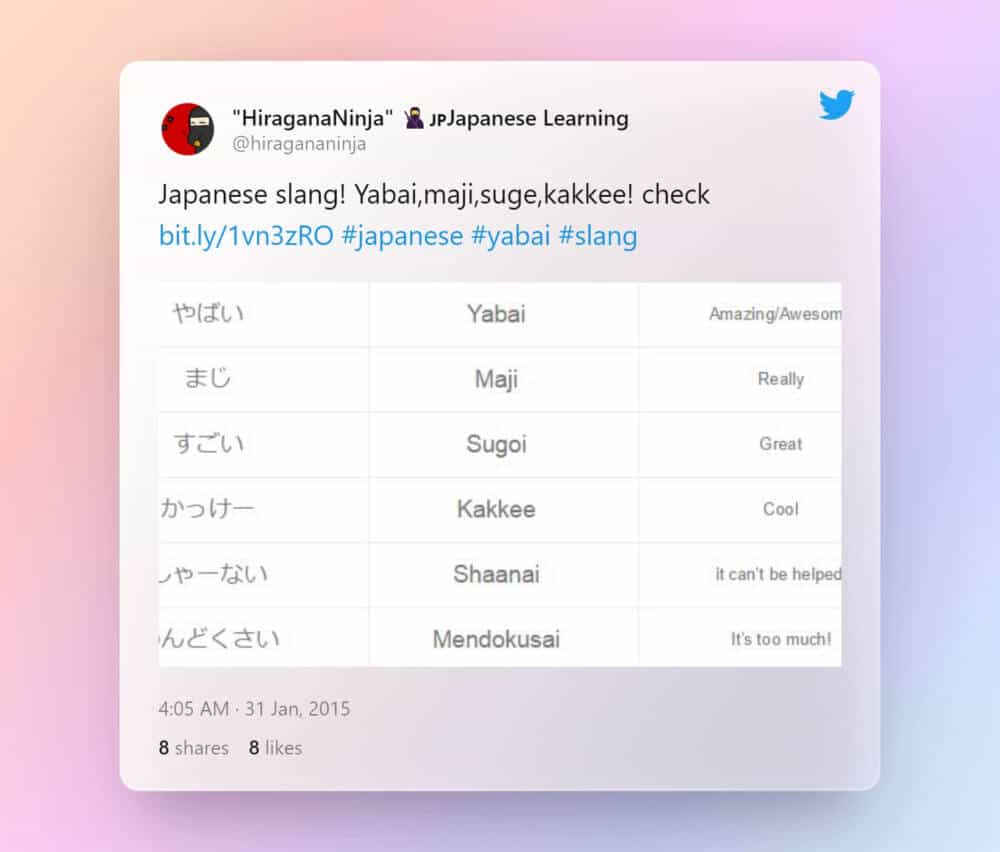Do you know the meaning of maji in Japanese? If not, read on to learn more about this popular Japanese word and how to use it?
How familiar are you with the Japanese term “maji” which means ‘really?’ When the natives raise their pitch, it means ‘really?’ when they don’t, it means just ‘really.’ Are you confused? Let us simplify things.
The word Maji is very familiar to Japanese learners. Do you want to know why? You can hear this term in almost every Japanese movie, anime, song, manga, and so on.
This expressive slang became popular in the 1980s among the younger generation and has been used since the Edo Period.
It originated from the adjective Majme (真面目)which means honest and serious. It was used as a language by backstage performers in the industry and theatre.
The word ‘majide’ expresses seriousness and sincerity and ended up becoming maji, the adverb we frequently use in the Japanese language.

- Related: Meaning Of Ureshii And Tanoshii
- Related: Meaning Of Moe Moe Kyun In Japanese
- Related: Meaning Of Daijoubu And How To Use It
In this article, I will explain the real meaning of this word and how to use it through example sentences. Then, let’s get started!
Meaning Of Maji In Japanese
What Is The Meaning Of Maji? (マジ (まじ)
The Japanese word ‘maji’ has several meanings. Maji is grammatically a conjugated an-adjective and used in daily conversations to mean-‘seriously,’ ‘really’, ‘serious’ in Japanese.
People also use it as an individual word to express when they are surprised or serious, so it is equivalent to the English word- ‘really?’
You can write this word in katakana, but the hiragana expression is also understandable and acceptable. But it highly depends on the other words used together.
Maji is used as a noun, or as ‘maji de’(マジで)an adverb or as an adjective or maji ni(マジに). The different meanings include: seriously, really, truly, genuinely, actually.
Sometimes they say-Maji, yabai(マジ、ヤバい)which means It’s a really bad situation or It's really cool.
“Eee, maji de?(ええー、マジで?) is also used which means Is that true? Or You must be kidding!
You can also say: Maji ka —(マジかー)which means No way! or No kidding? Or Seriously? Or Come on! Or Oh my/ boy/ my goodness or Really? Or Come on!
Finally, you can say ‘Maji de ureshii—!(マジでうれしいー!)which means I’m really happy!
What Is The Origin Of Maji?
There are some documents from the Edo period which support that ‘maji’ was used during this time.
The word during that time was short for the word majime(まじめ:真面目) meaning it’s true or serious.
So, it did not have the same meaning as it has today. As already mentioned before, the word amji was used by the entertainers and performers backstage during the Edo period.
It first appeared on TV in a drama in the late 1970s and in the early 1980s it was incorporated in a famous singer’s lyrics which said:
Maji ni omae wo daita
マジにお前を抱いた
I hugged you seriously
This song triggered the use of the word maji among young people and became popular as slang ever since.
In the 1980s, yankii characters or Japanese delinquents became popular in dramas, movies, manga and anime.
They used words like ‘maji daze’ and it is believed that its meaning gradually changed from there.
In the late 1980s, there was even a manga about yankii with the title 本気 (the original meaning is serious) and there was a furigana or small letters written next to kanji telling you how to read the word maji.
In addition, during the late 1980’s and early 1990s, comedians often used the term in their shows and the meaning was the same as what the yankii characters used. It became popular among the audience as well.
Different Ways To Use Maji In Japanese
How to say ‘I’m serious’ in Japanese:
「私はマジです」と彼女は言った (「わたしはまじです」とかのじょはいった)
「watashi wa maji desu」to kanojo wa it ta
“I’m serious”, she said
This is a typical usage of the word and works well as a part of the quote clause, ‘watashi wa maji desu’ meaning ‘I’m serious’ in Japanese.
You can use this better for casual situations but can work together with ‘desu’ the auxiliary verb, for a bit more formal situations.
Just remember whenever you want to say “serious” in Japanese conversations, this word would be the best option.
Let us break down this example a little further.
Watashi or 私 (わたし) is a pronoun in Japanese meaning ‘I.’
Wa or は is a binding particle that works in thai cases as a topic maker or case maker. It is used twice in the sentence. The first time after watashi to make the subject in the clause and the second time after ‘kanojo’ to make the subject in the sentence.
Desu or です is an auxiliary verb used after an adjective or noun to make it sound polite. In the above example,desu is used after maji to make it more polite.
To or と is a case particle that works as a quote maker. In the example, it is used after ‘watashi wa honki desu’ to indicate what she said.
Kanojo or 彼女 (かのじょ) is a pronoun in Japanese meaning ‘she.’
It or 言っ (いっ) is one conjugation of the verb in which means to tell or to say in Japanese. In the example it has been conjugated with its following word for a better connection.
Finally, Ta or た is an auxiliary verb used after an adjective, verb, or auxiliary verb to make its past tense form. In the example, it is used after ‘it’ to make its past tense form- ‘it ta’ meaning ‘to have said’ in Japanese.
Let us look at another usage of the term maji. You can also use it to say- Are you serious? Seriously? Really?
マジですか? (まじですか?)
maji desu ka?
Really? / Seriously? / Are you serious?
This is another typical usage of this popular slang and works well as a part of the interrogative sentence.
In more casual conversations with our friends or family members, we can say ‘maji’ with the pitch raised.
In Japanese anime, manga, movies and many popular characters say ‘maji’ with its pitch raised to express that they are surprised or shocked by something.
Below is the breakdown of the example sentence.
Ka or か is a sentence-ending particle to make a question and works well at the end of the sentence.

Examples Of Maji in a Sentence
まじ卍
Maji manji.
卍" has little significance and is used to emphasize on the term maji. Both words are used in a conversation to make it have a good rhythm.
お前、マジムカつく
Omae, maji mukatsuku
You are seriously annoying.
お願い、マジでお願い
Onegai, maji de onegai
Please, seriously, please.
マジパない
Maji panai
That’s surprising or That’s awesome.
マジでおまえすげーよ!
Majide?? Omae Sugeyo!
Oh really? You are awesome
おいおい、マジビビったよー
Hi hi, maji bibitta yo
Hey it was really surprising
- Related: Meaning Of Mono And Koto In Japanese
What Is Maji Yabakune?
This is a very famous catchphrase from the hit anime in 2017 called Miss Kobayashi's Maid Dragon.
After the catchphrase's appearance, its usage became a hit among anime fans. It can be translated into: Isn't that wicked?
The phrase originated from a background character when Tohru shows Kanna around the city and explains certain things Kanna sees.
When they saw the background character talking on the phone, they heard this phrase and Tohru explained to her that it is a magical word that everyone uses.
Kanna also tried to use it in her school conversations which strangely affected her classmates.
Since yabai is both a negative and a positive word, it is not known whether the person is confirming or denying it. The English translation of this expression can mean both good and bad.
Menaing of Maji: FAQs
What are some other synonyms of Maji?
What does Maji Yabai mean?
Conclusion
To summarize, I have explained the definitions and meanings of ‘maji’ with the help of example sentences.
As mentioned before, Maji (マジ (まじ) is often used as an individual slang word to mean seriously, serious or really.
When we raise our pitch, it can work as a question to mean ‘are you serious?’ or ‘really?’ or ‘seriously?’ in Japanese. When we do not raise the pitch, it means a normal serious or seriously or really.
When we want to express that we are surprised or serious about something, then using this word would be a good option.
Or else this word is a kind of colloquial expression and best suited for casual situations. It can work together with ‘desu’ to fit with more formal situations.
Hope my explanations are helpful and you get a better understanding of this term. Do not forget to share this article with your friends!
Also Read:





